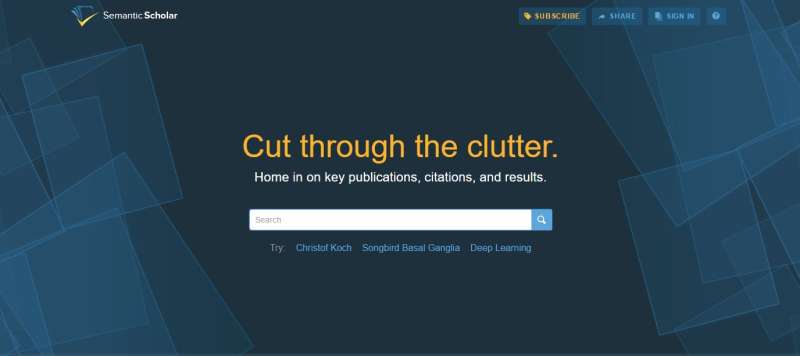November 12, 2016 weblog
Semantic Scholar search engine is expanded into neuroscience

(Tech Xplore)—Allen Institute for Artificial Intelligence is in the news with its smart search engine, Semantic Scholar.
Namely, they are expanding their intelligence-based search engine service into neuroscience research.
Nicola Jones said Friday in Nature that Semantic Scholar "is expanding its corpus of papers to cover some 10 million research articles in computer science and neuroscience."
With a corpus including computer science and neuroscience papers, Wired's Cade Metz said the organization also plans on expanding into other subjects.
"By next year, it says, the service will cover all biomedical literature as defined by PubMed, the existing medical and science database."
Semantic Scholar as you may know is a way for researchers to sort and rank academic papers with its understanding of both content and context. (When first launched, said Jones, Semantic Scholar was restricted to 3 million papers in the field of computer science.)
AI2 was founded in 2014 with a focus on research and engineering in the field of artificial intelligence, and unleashing AI for the "common good."
AI2 is led by Dr. Oren Etzioni. His area of expertise is AI and computer science.
Semantic Scholar is an aid for fighting what the AI2 site calls "information overload."
With the vast number of research papers published each year, scientific literature search is no romp in the woods. How vast is vast? Cade Metz in Wired said, "one independent study says that the number of papers is increasing about 4 or 5 percent a year, with 2.5 million published in 2014. That means researchers just don't have the time to look through everything. They need some help."
Better than just taking a key word and running with it, the engine is designed to find the most relevant information efficiently. "We utilize methods from data mining, natural-language processing, and computer vision," said the AI2 site.
Metz in Wired laid out what value their engine brings to the research effort.
"The Allen Institute search engine is designed not only to help scholars find the papers they're looking for but also surface the specific results and images that can serve their own research."
Jones quoted an impressed neurobiologist. Andrew Huberman, at Stanford University, said, "It leads you through what is otherwise a pretty dense jungle of information."
Metz said its natural language processing algorithms can better understand what the paper is saying, plus computer vision technology to identify tables and photos in the paper and extract them.
Jones wrote that "these filters enable searches based, for example, on which part of the brain part of the brain or cell type a paper investigates, which model organisms were studied and what methodologies were used."
Carl Engelking in Discover said, "Algorithms track how often the study is cited, whether those citations are from influential scientists, and if there's been a recent uptick in a paper's citations. Semantic Scholar also pulls in buzz circulating on social media to put studies into further context."
Etzioni meanwhile has a compelling vision about how unleashing AI can make its mark. "What if a cure for an intractable cancer is hidden within the tedious reports on thousands of clinical studies? In 20 years' time, AI will be able to read—and more importantly, understand—scientific text. These AI readers will be able to connect the dots between disparate studies to identify novel hypotheses and to suggest experiments which would otherwise be missed. AI-based discovery engines will help find the answers to science's thorniest problems."
More information: www.semanticscholar.org/
© 2016 Tech Xplore



















